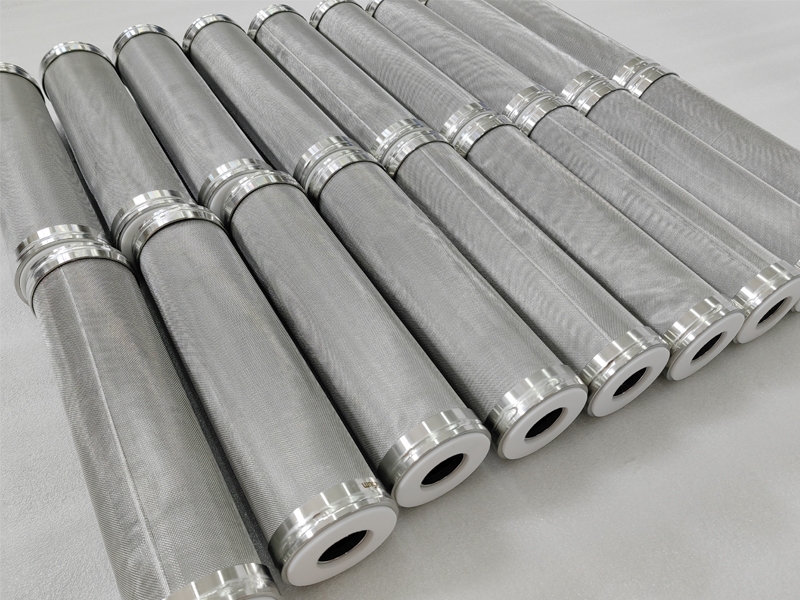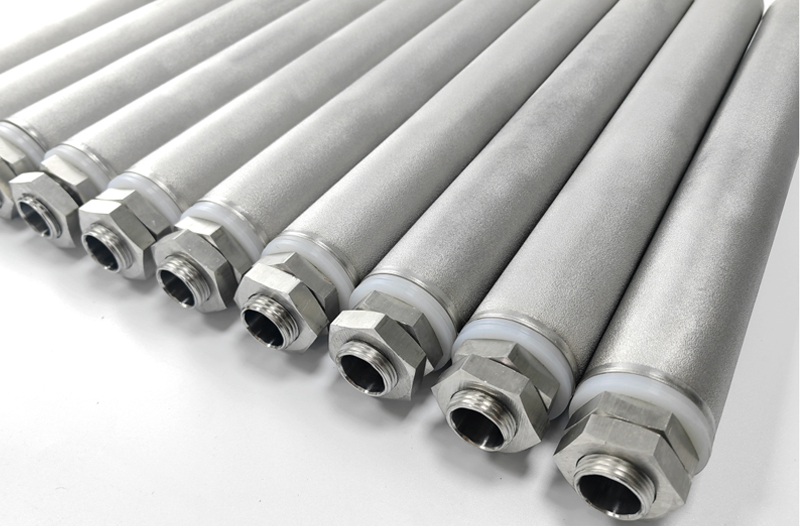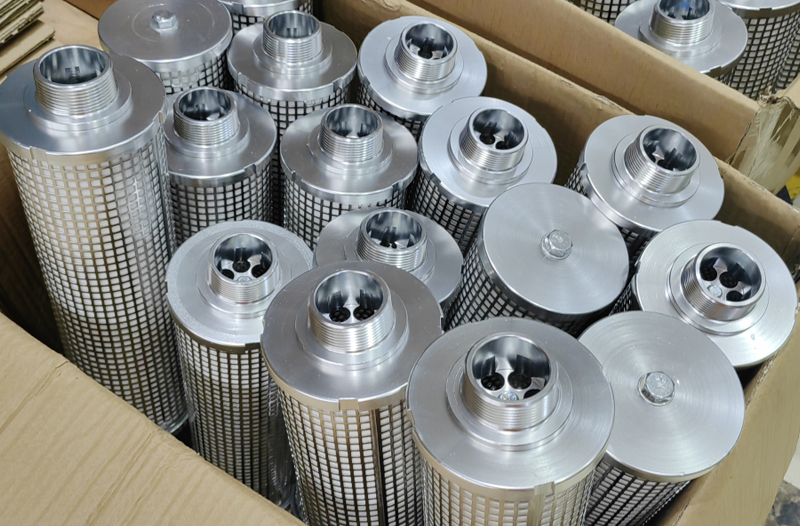A Comprehensive Guide to Sintered Filters: Features, Production, and Benefits
A sintered filter is a specialized filtration unit which made by compressing powder materials through a process involving heat and pressure. These materials bond together to form a porous structure that enables filtration while maintaining durability and strength. These filters are widely used in industries that require precise and efficient filtration of liquids and gases.
- What is a Sintered Filter?
- Characteristics of Different Sintered Materials
- Lvyuan sintered filters are renowned for several key features that set them apart from other filtration types:
- Steps of Producing Sintered Filters
- Advantages of Sintered Filters
- While sintered filters come with many benefits, there are some potential drawbacks to consider:
- Applications of Sintered Filters
- How to Choose the Right Sintered Filter
- Maintenance of Sintered Filters
- Environmental Impact of Sintered Filters
- Comparing Sintered Filters to Other Filter Types
- Challenges in Sintered Filter Technology
- Trends in Sintered Filter Development
- Why Sintered Filters are Essential for Industrial Applications
- Conclusion

What is a Sintered Filter?
A sintered filter is a specialized filtration unit which made by compressing powder materials through a process involving heat and pressure. These materials bond together to form a porous structure that enables filtration while maintaining durability and strength. These filters are widely used in industries that require precise and efficient filtration of liquids and gases.
Characteristics of Different Sintered Materials
The performance and properties of sintered metal filters depend heavily on the materials used. What Lvyuan common materials include stainless steel, bronze, titanium, and various plastics etc. Each material offers unique characteristics:
· Stainless steel is corrosion-resistant and durable, so makes it ideal for harsh environments.
· Bronze sintered filters provide excellent thermal and electrical conductivity.
· Titanium is lightweight and corrosion-resistant, making it suitable for medical and aerospace applications.
· Plastic porous filters provide a lightweight and flexible solution for industries where sintered metals may not be suitable.
Lvyuan sintered filters are renowned for several key features that set them apart from other filtration types:
High Durability: The bonding process creates a sturdy filter resistant to pressure, corrosion, and high temperatures.
Precise Filtration: The porous structure allows for accurate control over particle size and filtration levels.
Reusability: Many sintered filters are designed to be cleaned and reused, making them a cost-effective choice in the long run.
Uniform Structure: The consistent pore size ensures even filtration across the entire surface, improving overall efficiency.
Steps of Producing Sintered Filters
The production of Lvyuan sintered filters follows a detailed process involving the following steps:
· Material Selection: The base material is selected depending on the intended application.
· Powder Preparation: The selected material is reduced to fine powder.
· Compaction: The powder is compressed into the desired shape under high pressure.
· Sintering: The compacted material is heated to just below its melting point, which causing the particles to bond.
· Final Shaping: The filter is shaped and finished to meet specific dimensional and functional requirements.

Advantages of Sintered Filters
Sintered filters offer numerous advantages that make them highly desirable in industrial applications:
Long Service Life: Their robust structure extends their operational lifespan compared to other filter types.
Chemical Resistance: Sintered filters, particularly those made from stainless steel or titanium, resist corrosive chemicals, making them ideal for harsh industrial environments.
Temperature Tolerance: These filters can withstand extreme temperatures, both high and low, without losing structural integrity.
Cost Efficiency: Due to their reusability and long life, sintered filters offer great value for money in the long term.
Eco-friendly: The ability to clean and reuse sintered filters reduces waste and minimizes environmental impact.
While sintered filters come with many benefits, there are some potential drawbacks to consider:
· Higher Initial Cost: Compared to disposable filter cartridges, sintered filters may have a higher upfront cost, but they offer a much longer lifespan.
· Complex Manufacturing: Even minor manufacturing errors in production can impact the performance of the filter.
· Not Ideal for All Applications: Certain processes may require finer filtration than what sintered filters can provide, thus limiting their use in specific industries.
Applications of Sintered Filters
Sintered filters are used in a variety of industries due to their versatility and efficiency. Common applications include:
Pharmaceutical Industry: For filtering gases and liquids in sterile environments.
Food and Beverage Industry: Ensuring the purity of ingredients and protecting production processes from contamination.
Automotive Sector: For fuel filtration and emissions control.
Chemical Processing: Handling corrosive substances and high temperatures.
Aerospace and Defense: Used in demanding environments where reliability is critical.
How to Choose the Right Sintered Filter
When selecting a sintered filter, consider the following factors:
· Material Compatibility: Ensure the material matches the fluid or gas you are filtering.
· Pore Size: The pore size must match the particle size that needs filtering.
· Operating Environment: Consider temperature and pressure conditions.
· Reusability Needs: Determine if you require a filter that can be cleaned and reused.
Maintenance of Sintered Filters
To ensure the longevity and optimal performance of sintered filters, proper maintenance is crucial:
Regular Cleaning: Remove built-up contaminants by backwashing or using ultrasonic cleaning methods.
Check for Wear: Inspect the filter regularly for signs of wear or corrosion.
Handle with Care: Avoid dropping or impacting the filter to prevent damage to the porous structure.
Follow Manufacturer Guidelines: Always adhere to the manufacturer’s instructions for cleaning and replacing the filter.
Environmental Impact of Sintered Filters
Sintered filters contribute to environmental sustainability in several ways:
· Reduced Waste: Reusable filters reduce the need for disposable alternatives, decreasing waste in industrial processes.
· Energy Efficiency: Their high filtration efficiency means less energy is required to push fluids or gases through the filter.
· Minimal Maintenance Waste: Cleaning methods such as backwashing generate less waste compared to replacing disposable filters.

Comparing Sintered Filters to Other Filter Types
Sintered filters stand out when compared to other filter types like paper or fabric filters:
Durability: Unlike disposable filters, sintered filters are much more durable and can handle harsh conditions.
Filtration precision: Due to their uniform pore structure, sintered filters offer more precise filtration compared to many fabric filters.
Cost Over Time: Although sintered filters have a higher initial cost, their reusability makes them more economical in the long term.
Challenges in Sintered Filter Technology
Despite their many benefits, sintered filters face some challenges in technology:
Advanced manufacturing technology is required: Producing sintered filters with extremely fine pore sizes demands cutting-edge technology.
Customization: Tailoring sintered filters for specific industries may require significant investment in research and development.
Trends in Sintered Filter Development
The future of sintered filter technology is bright, with several trends emerging:
Nano-sintered Filters: These filters, with even finer pore sizes, are being developed for ultra-precise filtration needs.
Sustainable Materials: There is a growing trend toward using more eco-friendly materials in the production of sintered filters.
Integration with Smart Technology: Filters with sensors to monitor performance and maintenance needs are becoming more common.
Why Sintered Filters are Essential for Industrial Applications
Industries such as pharmaceuticals, food processing, and chemical production rely on the durability, precision, and reusability of sintered filters. Lvyuan provide an ideal solution for processes where maintaining purity and protecting equipment from contaminants are crucial.
Conclusion
Lvyuan sintered filters offer a range of benefits, from precise filtration to long-lasting durability, making them essential in many industries. While we may require careful manufacturing, our advantages far outweigh any drawbacks. As technology advances, our sintered filters will continue to evolve, offering even greater efficiency and sustainability.

What is Sintered Metal Filter? Complete Guide by Lvyuan

Sintered Filter Element Manufacturing Process and Applications

Applications of Sintered Metal Filters in Manufacturing

Why Lvyuan Is the Best China Manufacturer of Sintered Metal Filters

How to Clean Sintered Metal Filters: A Comprehensive Guide

Sintered Plastic Filters: A Comprehensive Guide
Sintered Titanium Filters
What are Sintered Titanium Filters?
Sintered titanium filters are porous metal components created through a sintering process, designed to provide efficient filtration in various applications.
Can Sintered Titanium Filters Operate Across a Wide Range of Temperatures?
Sintered titanium filters are capable of operating over a wide range of temperatures, adapting to diverse industrial settings and applications.
Sintered mesh filters
How do I clean and maintain a sintered mesh filter?
Sintered mesh filters are generally easy to clean. They can be cleaned using methods such as backwashing, ultrasonic cleaning, or chemical cleaning. Regular maintenance helps extend the filter's lifespan and maintain optimal performance.
For products
What applications are suitable for sintered metal filters?
Sintered metal filters are versatile and find applications in various industries such as pharmaceuticals, petrochemicals, food and beverage, water treatment, and more. They are commonly used for gas and liquid filtration.
For company
How can we get the quotation of filter cartridges?
Please tell me the model or specification you need, such as material, length, size, industry, etc.

Bag filter housing
Bag filter housings are essential components in industrial filtration systems, designed to remove contaminants from liquids. To enhance the functionality and efficiency of bag filter housings, various features can be incorporated.

Sintered powder metal filters
Sintered powder metal filters are crafted from compressed and sintered metal powders, forming a porous structure. Porosity: 28%-50% Permeability: 0.02-20L/cm²minPa Pressure Resistance: 0.5Mpa Temperature Resistance: Less than 280℃

Stainless steel multi cartridge filter housing
Discover unparalleled filtration efficiency with our Stainless Steel Multi Cartridge Filter Housing – a testament to precision engineering and reliability.

Sintered wire mesh filter
Benefit from outstanding high-pressure resistance and consistent filtration efficiency with Lvyuan's sintered metal mesh. Our sintered wire mesh finds versatile applications in diffuser screens, centrifuges, breather vents, fluidized beds, chromatography, polymer processing, petrochemical industries, hydraulic filters, and more.

stainless steel filter water
Lvyuan’s sintered stainless steel filter stands as a pivotal filtration element crafted through a meticulous sintering process, with stainless steel serving as the core material.

Sanitary filter housing
This filter housing will allow you to filter large volumes of nanoemulsion with ease. Sanitary vent and drain valves permit easy venting, draining, sampling, or integrity testing operations. The new cartridge locking design features additional cut-outs for traditional half-moon portions of the Code 7 bayonet locks, enhancing clean ability and drain ability.

Stainless steel pleated filter cartridge
Lvyuan Stainless Steel Pleat Filter Cartridge constructed from high-quality SS 304 or SS 316L material, this filter exhibits exceptional resistance to high temperatures and rust.

Stainless Steel Duplex filter housing
As the manufacturer, we offer a comprehensive range of Duplex Filter Housings designed to provide efficient and reliable filtration solutions for various industrial applications.
© 2024 Lvyuan All Rights Reserved. | Privacy policy • Terms and conditions
